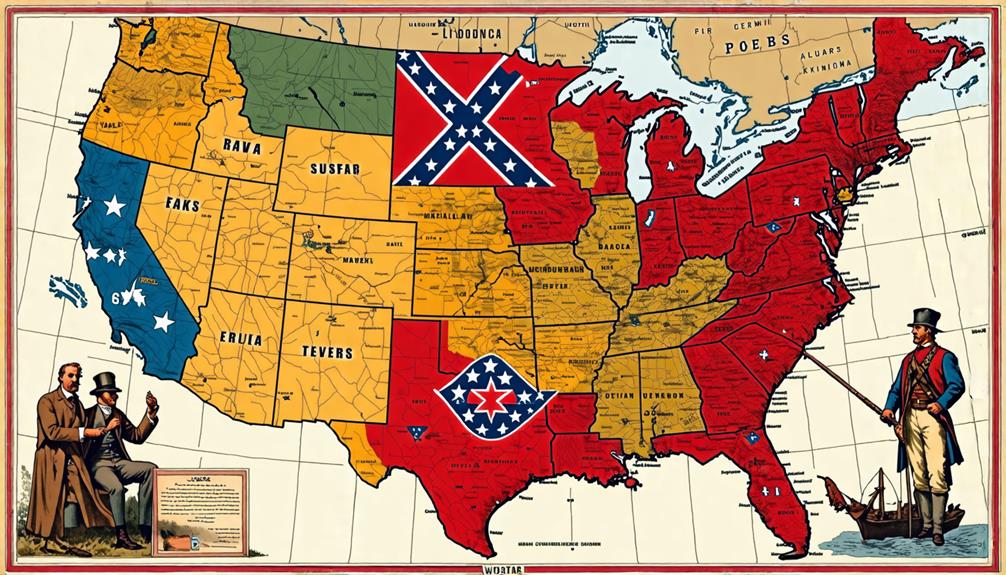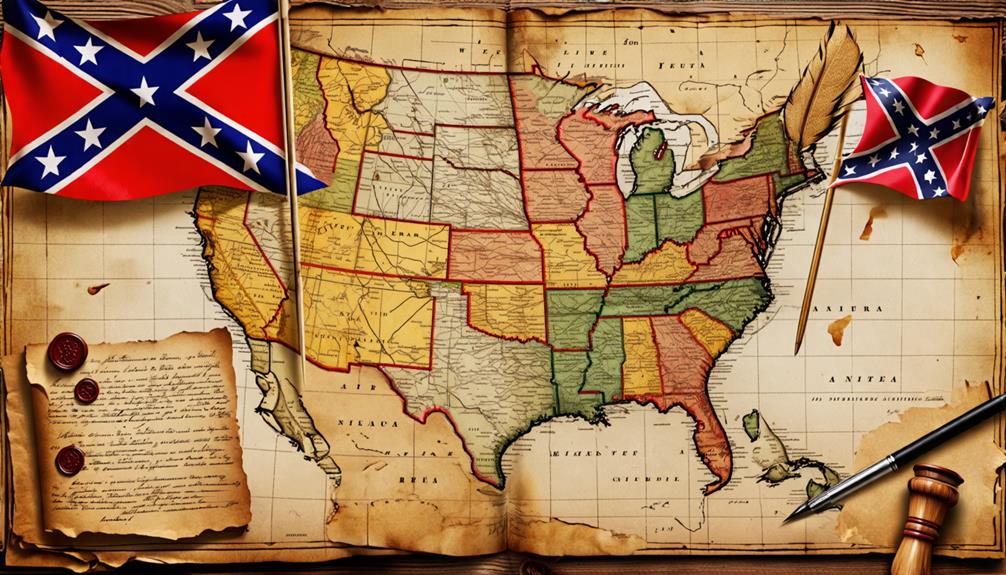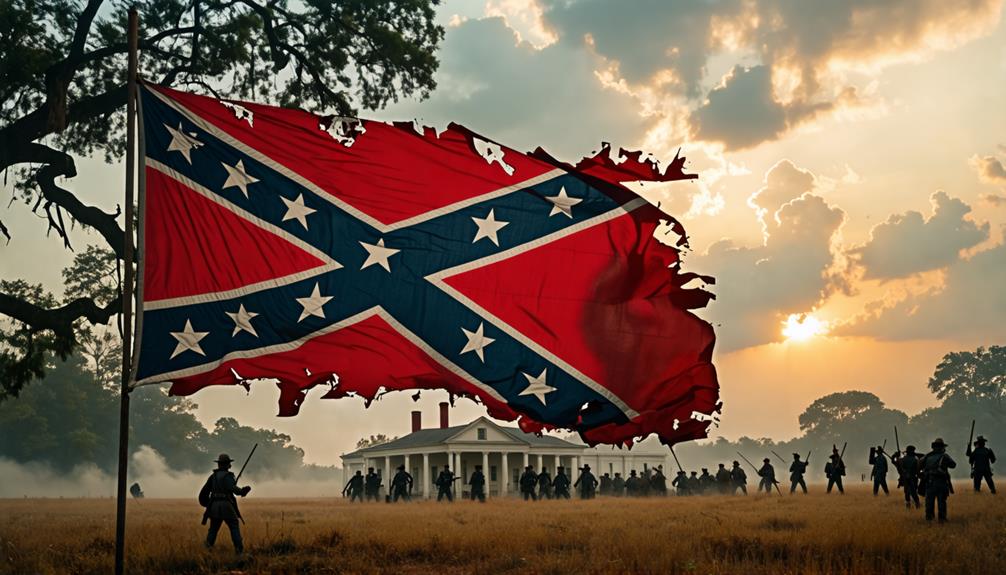What if the Confederate States of America had won its independence during the Civil War?
How would the course of history have changed if this improbable scenario had occurred?
Imagine a North America divided, with the United States and Confederate States coexisting as separate nations.
The CSA, built on the foundation of slavery, would face immense challenges modernizing its agrarian economy and gaining international legitimacy.
Slavery's Fate

If the Confederacy had won independence, it likely would have meant the continuation of slavery as a permanent institution in the Southern states. This could have resulted in a very different trajectory for race relations and civil rights in North America.
Some historians theorize that an independent Confederacy may have eventually abolished slavery on its own, due to economic pressures or international condemnation. However, others believe slavery would have persisted much longer, shaping Southern society and politics for generations.
It's also possible that a surviving Confederacy could have come into conflict with the United States again over issues like the expansion of slavery into new territories.
In our actual timeline, the Confederacy was defeated and slavery ended in 1865. However, the struggle for civil rights and racial equality continued long after, and to some extent still continues today.
Economic Implications
A victorious Confederacy may have encountered significant economic hurdles, such as difficulties industrializing while depending on cash crops and slave labor.
One theory is that this would have resulted in a nation with inadequate infrastructure, struggling to compete globally.
It's possible that trade barriers and tariffs imposed by the United States could have further impeded economic development, potentially leading to ongoing poverty and inequality in the South.
Interestingly, a similar scenario did occur later in history, when Rhodesia (now Zimbabwe) unilaterally declared independence from the United Kingdom in 1965, facing international sanctions and economic challenges as a result.
Political Landscape

In an alternate timeline where the Confederacy gained independence, North America's political landscape would have looked quite different. One theory is that two rival nations, each with their own government and leaders, would have emerged and maintained an uneasy coexistence. Scenarios ranging from reunification to open hostility could have played out over time.
It's possible that under certain conditions, like economic collapse in the South or containment policies by the North, the two nations would have eventually reconciled or even reunited. Alternatively, the Confederacy may have allied with European powers while the Union focused on isolating the South, leading to a sort of cold war. Trade deals, border disputes, and industrial reforms in the South are other potential outcomes that could have occurred in this alternate history.
While the Confederacy didn't gain independence in reality, a similar scenario did occur nearly a century later when India was partitioned into two separate nations – India and Pakistan. The complex and often strained relations between those two countries since then provide an interesting parallel to what North America could have experienced.
Of course, no one can say for certain how events would have unfolded, and it's up to the reader to consider the various possibilities.
Territorial Expansion
If the Confederacy had achieved independence, a competition for control over western territories like California, Texas, and the Southwest would have been likely. One theory is that border skirmishes, complex negotiations, and proxy conflicts would have erupted as the South sought to expand slavery while the North aimed to contain it.
It's possible this could have led to an earlier version of the Spanish-American War in the late 1800s, with the Union and Confederacy vying for influence in places like Cuba, Puerto Rico, and the Philippines.
Some historians speculate that an independent Confederacy may have tried to acquire new slave states in the Caribbean and Central America. This could have meant changes to the balance of power in the Western Hemisphere, with a divided United States less able to enforce the Monroe Doctrine.
It's conceivable that European powers might've attempted to recolonize parts of Latin America in this scenario.
International Recognition

Had the Confederacy prevailed, securing international recognition as a legitimate nation would have been a critical challenge, particularly from major powers like Britain and France.
One theory suggests the South would have launched extensive diplomatic efforts to gain this validation, which could have elevated the Confederacy's global standing. However, it's possible that ongoing tensions over slavery may have complicated and prolonged this process, potentially straining relations with European nations opposed to the practice.
Interestingly, a somewhat similar scenario did occur in 1936 when Francisco Franco's Nationalist forces succeeded in overthrowing the Spanish Republic after a three-year civil war.
Although the contexts differed, Franco also sought international recognition for his regime, which he eventually secured from many nations, despite opposition due to his authoritarian policies.
Technological Advancement
In an alternate timeline where the Confederacy gained independence, its path to technological advancement would likely have differed from the Union due to its agrarian-focused economy and the damage inflicted by the Civil War. One theory is that progress in areas like industry, transportation, and communication may have lagged behind the North.
However, the Confederacy's reliance on agriculture could have spurred innovation and mechanization in farming to stay competitive in global markets.
It's also possible that a later attempt at Southern secession, such as the 1940s proposal by the Dixiecrats, might've played out differently in terms of relative technological advancement.
Cultural Divergence

In an alternate timeline where the Confederacy won the Civil War, the cultural differences between the South and North may have become more pronounced over time.
One theory is that the South would have leaned into its agricultural economy, traditional values, and entrenched racial caste system. Meanwhile, the North could have experienced a quicker pace of progressive reforms, industrialization, and moves toward greater social equality.
It's possible that similar attempts at Southern secession might've occurred later in U.S. history under different circumstances. However, the specific outcome and long-term ramifications of a Confederate victory in the 1860s would depend on a complex interplay of social, economic, and political factors that are difficult to predict with certainty.
Ultimately, readers will have to draw their own conclusions about how this alternate history would have unfolded.
Union Relations
In the event of a Confederate victory, relations between the South and the United States would likely have been strained for some time. One theory is that initial hostility and resentment on both sides would have gradually given way to pragmatic concerns like trade and security, necessitating some level of cooperation.
However, it's also possible that lingering ideological differences and animosity could have continued to strain ties for decades.
Diplomatic recognition and negotiated treaties would have been crucial for stabilizing the post-war relationship between the two nations.
It's worth noting that a similar scenario did occur later in history, with the partition of India in 1947 leading to the creation of India and Pakistan as separate nations.
As with any alternative history scenario, it's up to the reader to consider the various potential outcomes and impacts of a Confederate victory.
Conclusion
Imagine: you're living in a world where the Confederacy won its independence.
By chance, you stumble upon an old diary detailing life under the new Southern nation.
As you read, you realize the far-reaching implications of this alternate history.
Slavery persists, the economy struggles, and tensions with the Union remain high.
It's a sobering reminder of how the outcome of a single war can dramatically shape the course of a nation's future.

Leave a Reply